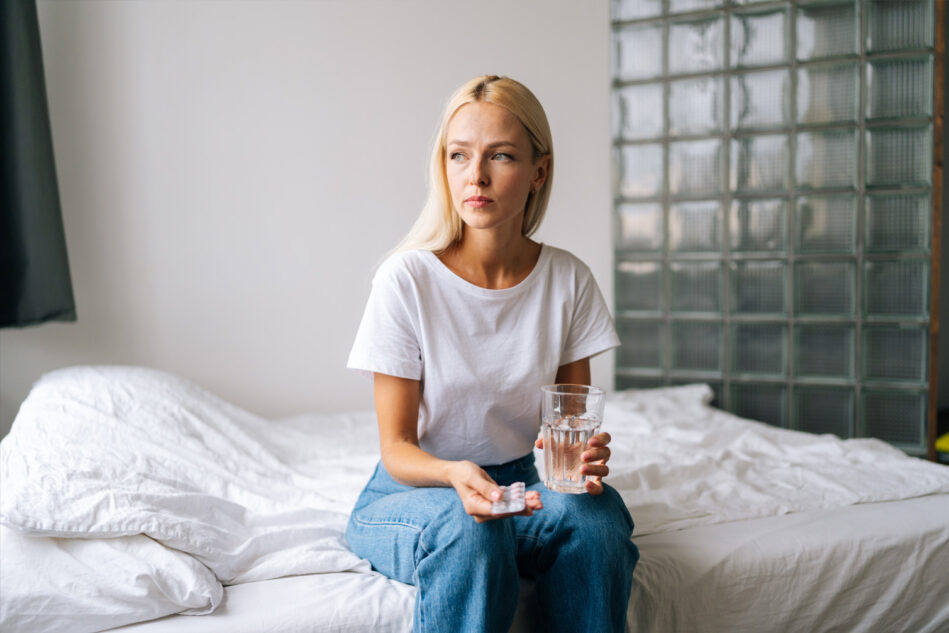I’ve never been a good sleeper. Even as a child, it took me upwards of an hour to fall asleep. In my teenage years, I tried taking melatonin—a supplement that helps signal to our brains that it’s time to sleep. Your body makes melatonin naturally, but adding a supplement can enhance its effects. I took it every night. One night in college, I was having such a difficult time sleeping that I ended up taking several doses (each an hour or so apart) but still couldn’t sleep. The next day, I decided the pills likely weren’t helping me, and it was time to stop taking them.
Since then, I’ve shied away from most sleeping supplements, though I’ve occasionally been intrigued by friends who swear by L-theanine or magnesium supplements. Should you try a sleep supplement? Here’s what you need to know about some of the most popular supplements for sleep.
A Word of Caution About Supplements
Before we delve into the world of sleep supplements, it is important to understand that not all are created equally. Vitamins, herbal medicines, and supplements don’t get the same scrutiny from the U.S. Food and Drug Administration (FDA) as drugs. The benefits and risks listed below are based on the assumption that your supplement contains exactly what is listed on the label and nothing else.
However, study after study has found that supplements can sometimes be tainted with pharmaceuticals or other contaminants that may cause unexpected side effects. Other times, the doses may not match what’s on the label. One study found that some melatonin supplements contained up to 347% more melatonin than the label advertised.
One way to reduce your risk is to check the label for a certification that the supplement has been tested by a third party. If companies submit their supplements for testing, groups like the National Science Foundation (NSF) and the United States Pharmacopeia (USP) can confirm that they contain the products listed on the label and don’t have unsafe levels of contaminants.
Melatonin
Melatonin is a classic sleep supplement. It’s a naturally occurring hormone that helps regulate our circadian rhythms—the rhythms of our body’s cellular functions, including our sleep-wake cycles. People have been using it for decades in the hopes of getting better shuteye. Its popularity increased dramatically between 1999 and 2018.
In 2022, the experts noted that there was a need for more studies on the long-term effects.
When you wake up in the morning, the light that hits your eyes stops your natural melatonin production. In the evening, as the sun goes down and the lights dim, you start to produce more of the hormone in your body. While some people (like myself) may take melatonin immediately before bed, you typically take it about two hours before you plan to go to sleep. We don’t know the most effective way to dose melatonin because the FDA does not regulate the supplement as a drug.
Does Melatonin Work?
Some small clinical trials have suggested that melatonin can reduce the amount of time it takes to fall asleep. Study participants who used it reported better sleep quality compared to those given a placebo.
Side Effects of Melatonin
Melatonin can make you sleepy during the day or lead to a headache or nausea. Some people who take it, including two of my own friends, report that they have bizarre dreams or nightmares that feel difficult to wake up from. They both woke up drained, decided the extra sleep wasn’t worth the dreams and stopped using melatonin.
There were no serious adverse events noted in a 2023 review of 22 studies on children and adolescents who took melatonin for a week to three months. However, an increase was seen in side effects that researchers considered non-serious, such as headache, nausea, red cheeks, red earlobes, sore/red eyes, fatigue, dizziness, vomiting, infections, mood changes, musculoskeletal pain and gastrointestinal problems.
While I felt it might have been easy for me to become dependent on melatonin for sleep, there’s no evidence that your body adjusts to the supplement by lowering your natural production of melatonin, and little risk of dependence or withdrawal.
Valerian
Researchers aren’t sure exactly how valerian works to improve sleep or anxiety and the Office of Dietary Supplements states that there isn’t sufficient evidence to suggest it helps with sleep disorders, but three clinical trials suggest it can reduce the time it takes you to fall asleep, and those who used it reported to the scientists that they felt their sleep had improved.
Side Effects of Valerian
Valerian may cause headaches, brain fog, stomach upset, and vivid dreams, according to the National Center for Complementary and Integrative Medicine.
Jennifer Silver, a dentist in Canada, says she tried valerian in hopes of getting better sleep.
“I found that it did help induce a sense of relaxation, which made it easier for me to fall asleep,” she says. “However, I did notice occasional vivid dreams, which could sometimes disrupt my sleep pattern or leave me feeling groggy in the morning.” She switched to magnesium, which she prefers because it helps relax her muscles.
Magnesium
Magnesium is a nutrient we all need in our diets, and deficiencies are common, according to several studies. Magnesium affects many body functions, such as blood pressure and glucose metabolism. For example, magnesium deficiency is associated with insulin resistance and blood sugar control.
Older adults who took magnesium supplements fell asleep 17 minutes faster than their counterparts who didn’t take it, according to a meta-analysis of three clinical trials. However, only 151 participants were included, and the researchers pointed out that all three studies used methods that put them at risk of introducing bias, so it’s important to take this data with a grain of salt.
Side Effects of Magnesium
Higher doses of a magnesium supplement may cause gastrointestinal distress, such as diarrhea. Magnesium can also interact with medications, such as antibiotics, so make sure to review these concerns with your healthcare provider before taking it.
L-Theanine
L-theanine is an amino acid found in tea and a popular sleep supplement. It seems one of L-theanine’s main benefits for sleep is that it can help counteract the effects of a cup of coffee or caffeinated green tea taken a little too late in the afternoon. One study compared four groups of women: one group who drank caffeinated green tea and took L-theanine, another who just had the tea, another who took L-theanine, and a group who had neither. The results showed that the women who drank the caffeinated beverage had poorer sleep than the placebo group, but the group who had L-theanine alongside the caffeine slept as well as those who had taken placebo. That suggested that L-theanine could negate the negative effects of caffeine on sleep.
If stress is preventing you from sleeping, an analysis of nine studies suggests that L-theanine may help you relax during acutely stressful times.
Side Effects of L-Theanine
Studies haven’t turned up any obvious side effects of L-theanine in animals, but more human research is needed.
CBD and THC
Cannabidiol (CBD) and tetrahydrocannabinol (THC), two of the active ingredients in marijuana, are popular sleep aids. A review of 34 studies suggested that CBD alone or in combination with THC improved people’s sleep, but the researchers pointed out that only two of the studies included patients with insomnia.
Side Effects of CBD and THC
THC is the chemical in marijuana that can make you feel high, so intoxication or sleepiness can be a side effect of supplements that include it. We’re learning more and more about these two compounds and how they impact our body’s systems.
One of the main questions you should ask your healthcare provider is whether these supplements can interfere with other medications you’re taking. As CBD supplements gained popularity, evidence quickly emerged suggesting that they can enhance the effects of common blood thinners such as warfarin. A case study published in 2017 showed that a 44-year-old man who was prescribed warfarin following heart surgery needed to reduce his dose by 30% after taking Epidiolex, an FDA-approved CBD product to treat epilepsy. A review published in 2023 turned up seven more instances in which warfarin and CBD interacted.
“The majority of interactions between medications and cannabis are ones where use of cannabis might increase the effects, including [the] side effects, of the other drug,” says Nina Bemben, PharmD, a pharmacist and senior content management consultant at Wolters Kluwer Health. “There are also some situations where cannabis might decrease the beneficial effects of another drug, which is the case for some antidepressants and even some chemotherapy agents.”
The Importance of Sleep
Sleep is crucial to both our physical and mental health, but many of us still get too little of it. Prescription and over-the-counter drugs come with the risk of serious side effects. In some cases, sleep-promoting supplements may provide a safer option. But it’s still important to carefully read the labels and discuss the use of any supplements with your health professional to ensure they won’t interfere with other treatments or cause problematic side effects.
And if a dose that helped you previously stops working for you, don’t follow my example of upping your intake in a single evening. Play it safe. Talk to your healthcare provider about other options.






